Hello everyone,
I’ve recently returned from western Kazakhstan, where I was making a BBC radio documentary about the Caspian Sea, as well as researching a possible larger project in the region. As ever, it was a fascinating trip, and I hope some of you will listen to my documentary - out on May 21st.
In the meantime, here’s a story about the unexpected things that happen when we travel. I’ve added an audio version this time, as a bit of an experiment, so if you'd rather listen to the story, please just click the button above.
Thanks for being here.
Love and hawthorns,
Antonia x
A few weeks ago, towards the end of a 600-mile drive across the Kazakh steppe, I began to feel desperate for trees, for shade, for respite from vast skies and flat horizons. Even from inside the car, the sun felt like a hammer, the steppe its anvil. Clammy and oddly anxious, I fantasized about burrowing underground, away from the obliterating sun. No wonder this part of Kazakhstan is littered with subterranean mosques.
Two days later I climbed into my friend Azarmat’s white Land Cruiser and headed out of Aktau, the city’s northern micro-districts dwindling to pale, treeless steppe. Azarmat had wanted to take me to Bozzhira, a famously beautiful canyon 200 miles to the west, but I couldn’t face another ten hours in the car, so had requested we visit Skakpak-ata cave mosque instead. ‘Believe me, Shakpak-ata will not impress’ Azarmat had written on WhatsApp the previous night. I sensed he was annoyed at not going to Bozzhira. But Shakpak-ata it was.
At Tauchik, a sun-blasted village an hour north of Aktau, we turned left off the main road, bumping the last five miles or so along a rough, chalky track. A herd of horses stood in a muddy watering hole, tails swishing, spindly-legged foals hoarding the shade. Camels grazed; their shaggy forms silhouetted against the bright, cloudless sky. Azarmat stopped the car for me to photograph one - a great brown beast with clumps of matted fur hanging from its flanks - but it turned its backside towards me and walked away in that stately, sullen manner so typical of their kind.
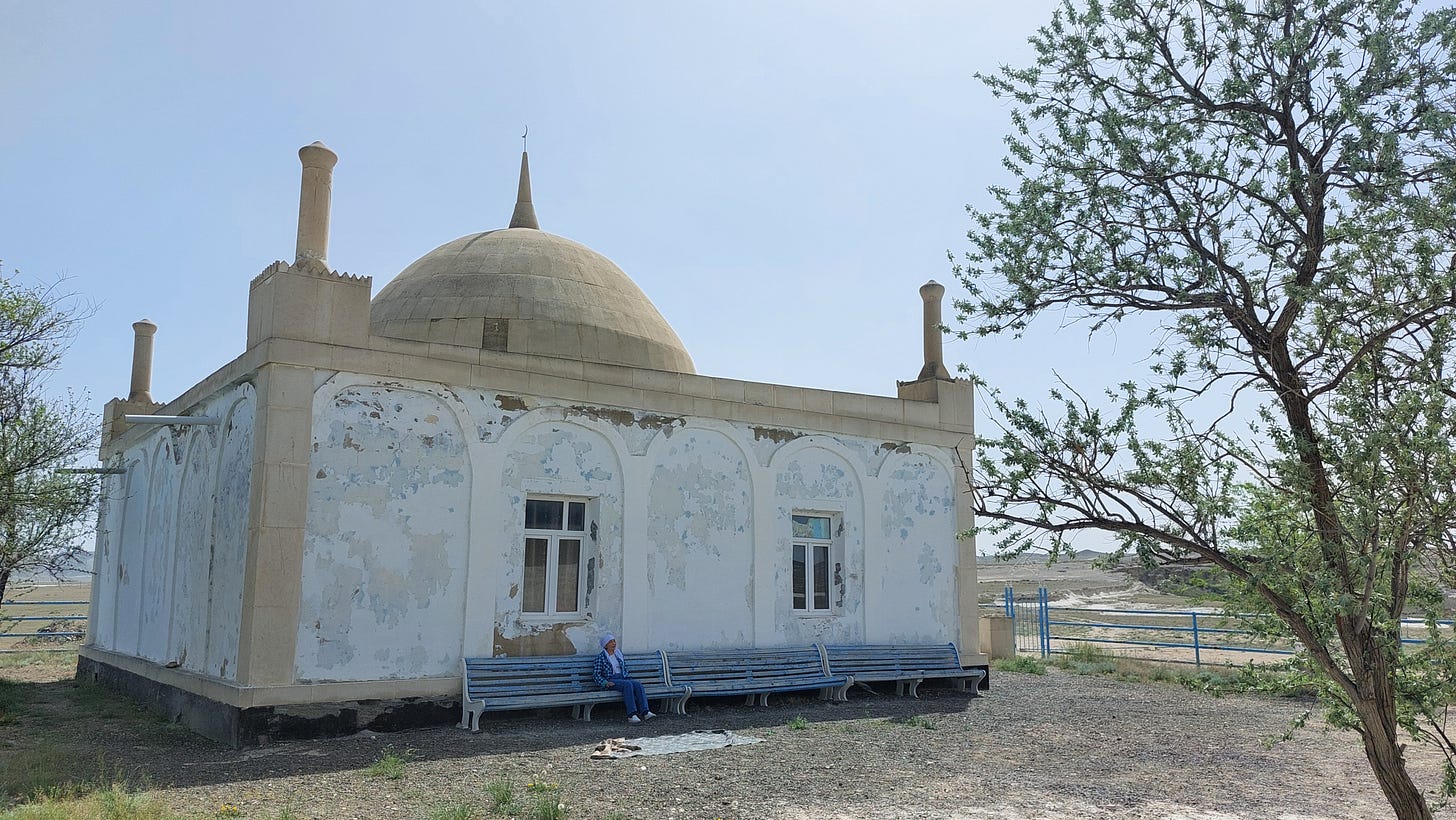
Cresting a low rise, the Caspian Sea appeared on the horizon, a glimmering blue line separating steppe and sky. Soon after this we parked outside a small whitewashed mosque where swallows hung on the wind, silvering the air with their chatter. With Azarmat’s limited English and my less than perfect Russian, I wasn’t entirely clear what this place was, or why we were stopping here. ‘We go here - see Shakpak-ata after,’ explained Azarmat, unlacing his boots and adding them to a jumble of footwear outside the mosque.
Inside, to my astonishment, several dozen people were sitting around a long low table laden with food. There were roundels of soft white non; bowls spilling with sweets and biscuits; plates of camel milk fudge; slices of sugary cake and scattered chunks of shelpek - a type of fried Kazakh bread. Ushered to a gap in the centre of the table, I sat cross-legged on the soft green carpet and took in the whole surprising scene. The glut of food. The arrestingly blue eyes of the man opposite me. The high cheekbones and gold headscarf of the young woman to my left. A pair of gaudy plastic chandeliers. The thickset man perched self-consciously on a stool a few places up. The murmurs and curious glances when Azarmat announced I was English.
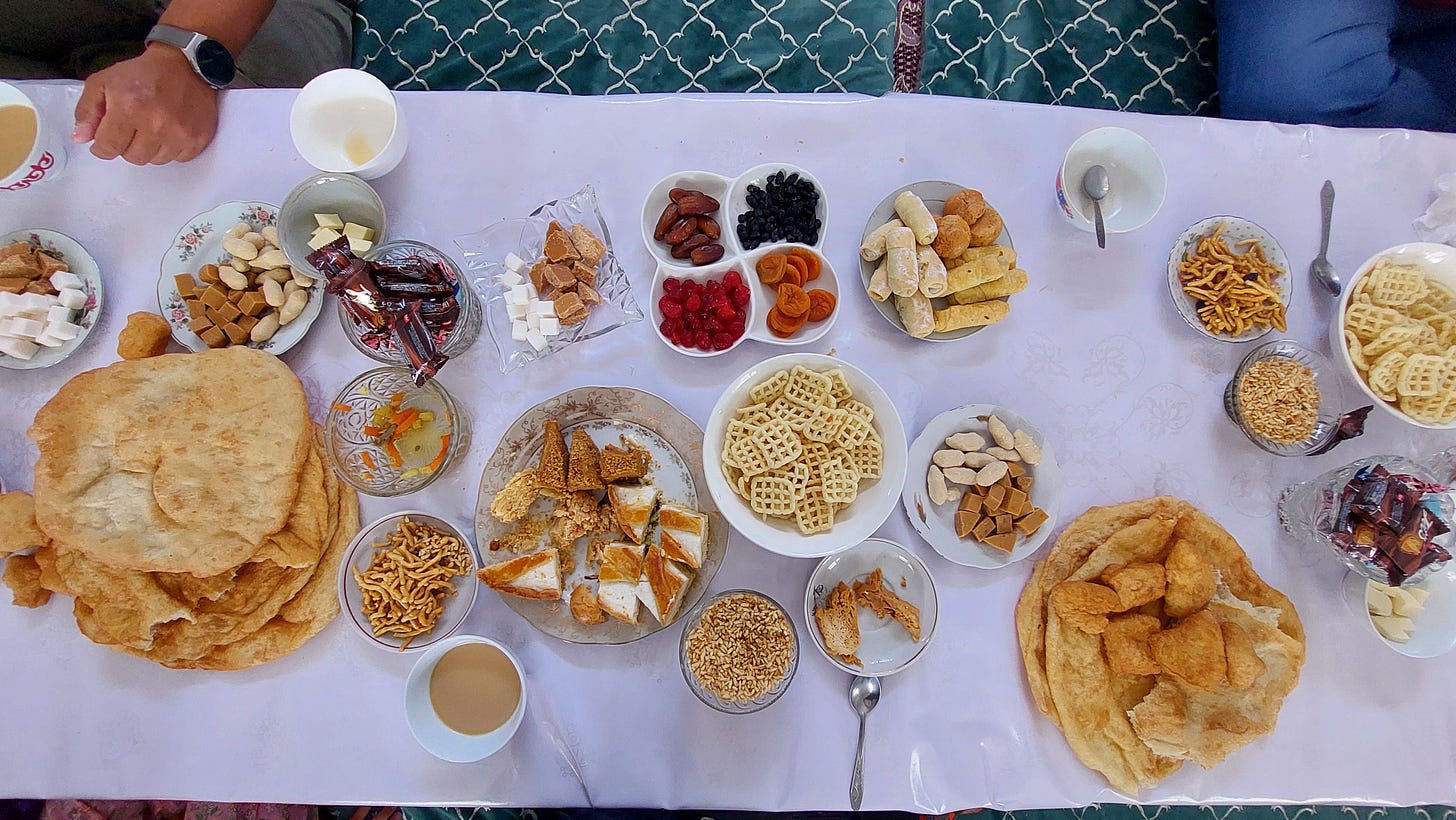
The people were all pilgrims, it transpired, and had come to visit Shakpak-ata, which lay just half a mile from here. Ten of them - including the big man on the stool - were from the Siberian town of Omsk, here on a tour of the holy places of Mangystau, this arid outpost of western Kazakhstan. I looked at their faces with interest, aware it was my first time among Russians since the start of the Ukraine war, and wondered how they felt about me, this Englishwoman in their midst. Then one of the ladies - a stout woman in a black floral dress - stood up, bustled around the table and presented me with a white headscarf. ‘It's a present from Omsk’ she said, taking it out of its plastic wrapping and tying it around my head. ‘You’re a strong woman with a big heart! Your grandfather was very strong! This scarf will bring you good health!’ she said, before returning to her place.
After lunch we sat on a wooden bench outside and had our photos taken together, my new Russian friends shuffling along to make space for me in the middle. I left feeling exhilarated by the encounter; reminded that people are not their governments. Yes probably, if we’d touched on the thorny issues of Putin, NATO or the war, our differences would have become glaring, the atmosphere tense. But for those precious moments we were happy in the simple act of breaking bread together, irrespective of our nations or beliefs.
It was a scaldingly hot April day, the wind like hot breath on my face. Leaving Azarmat to snooze in the shade of the mosque, his baseball hat pulled down over his boyish face, I walked the half mile to Shakpak-ata alone; grateful for my new headscarf, buoyed by my encounter with the Russians. At first all I could see was a chalky escarpment and a scattering of graves – some just piles of stones, others grand and recently built, like miniature Taj Mahals. But as I drew closer I could make out a sweep of white stone steps leading up to the cliff face, a single-columned portico, a small red door.
Meaning ‘father of flint’, after a Sufi healer who once lived in these caves, Shakpak-ata was hewn from the flanks of this cliff a thousand years ago, its architects no doubt motivated by that same desire to burrow underground, away from the desert glare. They chose well. Over millennia, the elements have sculpted the escarpment into sponge-like, Gaudiesque formations – as if the wind had been experimenting with Paleo-Baroque.
Inside, the cave opened out into a low-ceilinged, cruciform shaped mosque, the pale walls etched with Arab inscriptions and simplistic images of horses and hands. Light seeped in from a circular opening in the ceiling, and a faded red carpet ran down the centre, the ground on either side worn smooth by centuries of pilgrims’ feet. The silence! The coolness! The sacred, life-giving shade! It felt like stepping into the cool white womb of a fossilized beast.

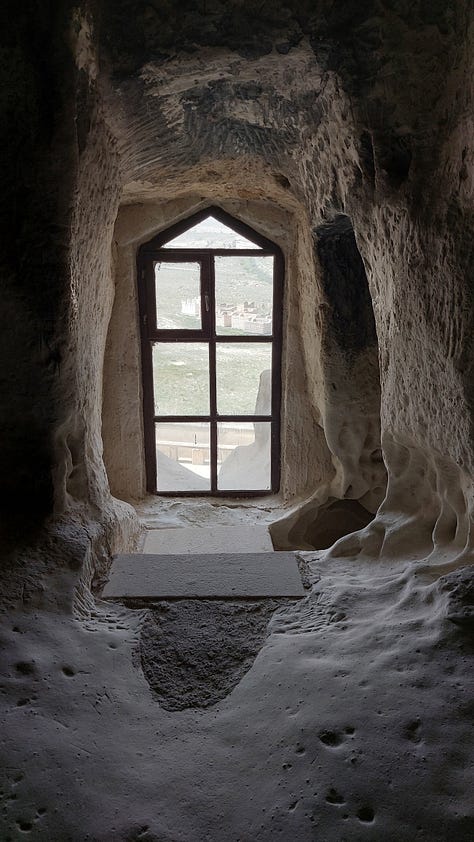
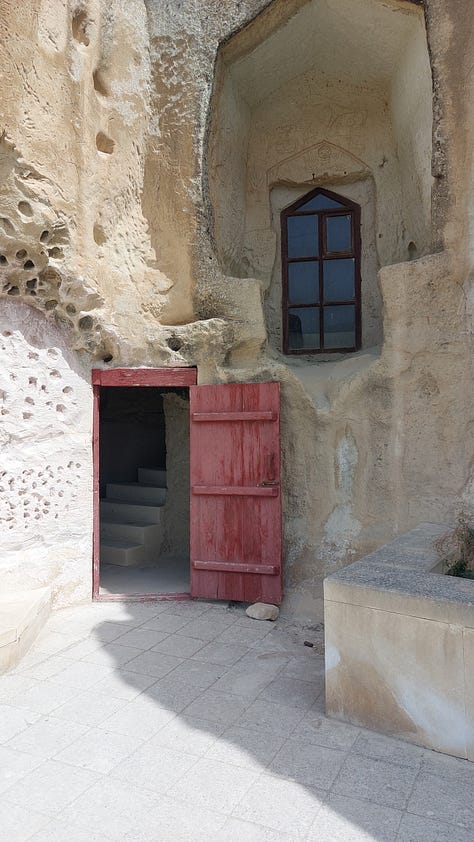
Alone here, I sat on the carpet, closed my eyes and let the silence of the place soak into my bones. I thought how much I'd like to sleep here, cradled by the rock, safe from the howling steppe winds.
Back outside, blinking in the sunshine, I stood on the lip of the escarpment and looked out across the yawning steppe. A pair of small, black and white birds (Collared flycatchers, I think) flicked along the cliff face. A single yellow butterfly danced past. In the distance - the dust cloud of a fast-moving vehicle, the faint ribbon of the sea. Standing there, I could sense my spirit waking up, my sap rising. That sweet thrill of new encounters. Walking back to find Azarmat, boots scuffing in the dust, spirits high, I reflected how important it is to be reminded of the things that make us come alive.
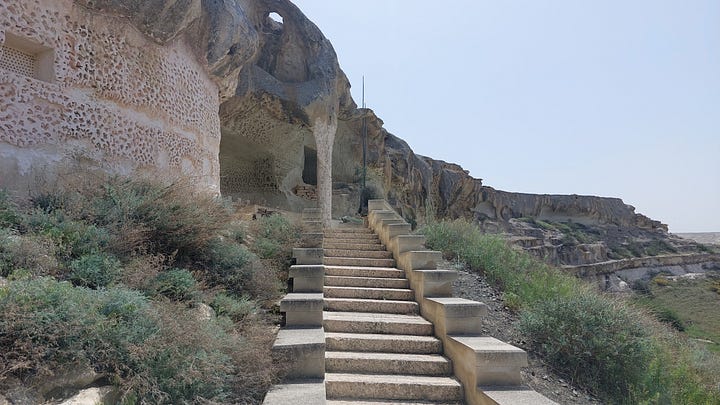
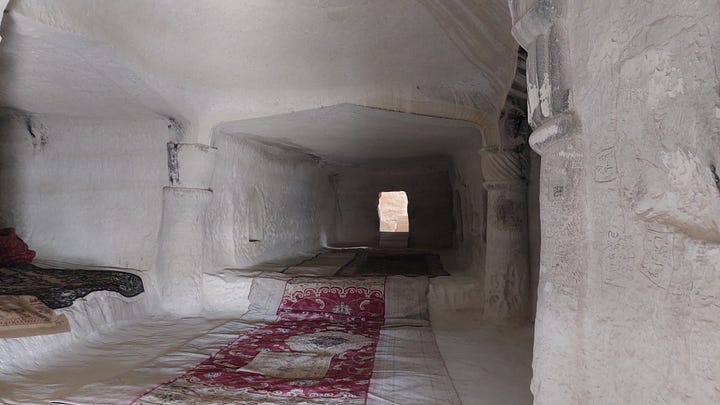
AND IN OTHER NEWS…
The Caspian Crisis, my next episode of Crossing Continents, will be broadcast on BBC Radio 4 on Tuesday 21st May at 21.00 and again on Monday 27th May at 00.15. It will also air on BBC World Service, as Assignment, on Tuesday 21st May at 09.30 GMT. You can also listen again online or on BBC Sounds.
I’ll also have a story about the Caspian Sea on BBC Radio 4’s From Our Own Correspondent, at 11.30 a.m. on Saturday 25th May. Again, it will be available on BBC Sounds after the broadcast.
Hay Festival starts on Thursday 23rd May. If you’re going, do say hello to my husband Marley, who has a Super Fungi stall there, and will be selling mushroom tinctures and oyster mushroom grow kits.
On Saturday 7th September I’m running a one-day Writing in Nature workshop with folklorist Pridie Tiernan at her beautiful farm in the heart of the Black Mountains. More details and tickets here.
Finally, I’d love to hear what YOU, my dear readers (and listeners) would like to see more of in this newsletter. More dispatches like this? More nature writing? More something else? Did you like the audio version? Please let me know by commenting on this post, or emailing me at antsbk AT gmail.com. Thank you.

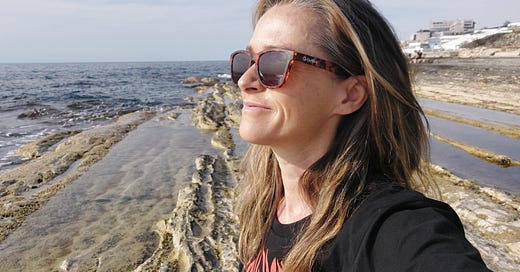



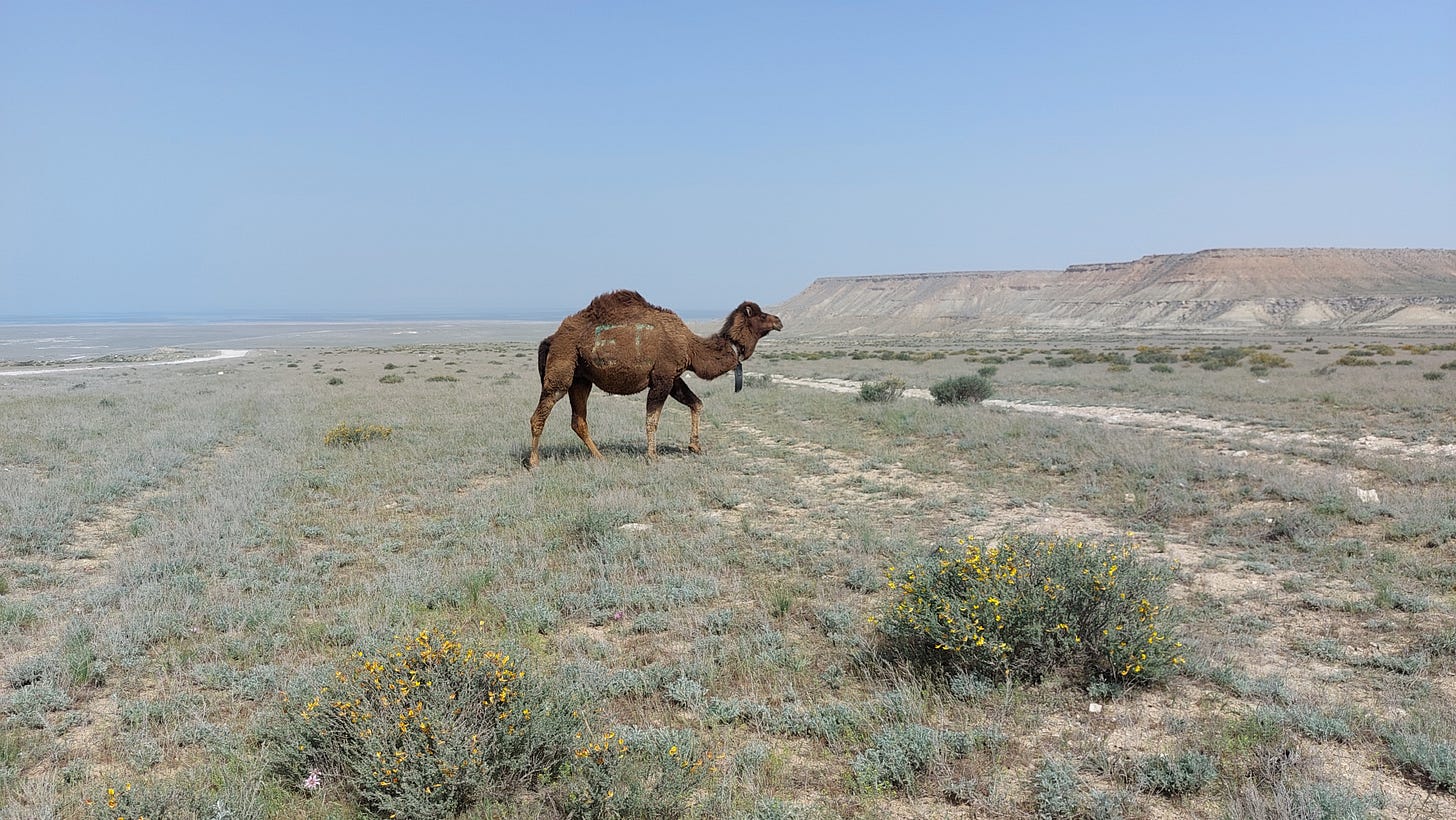
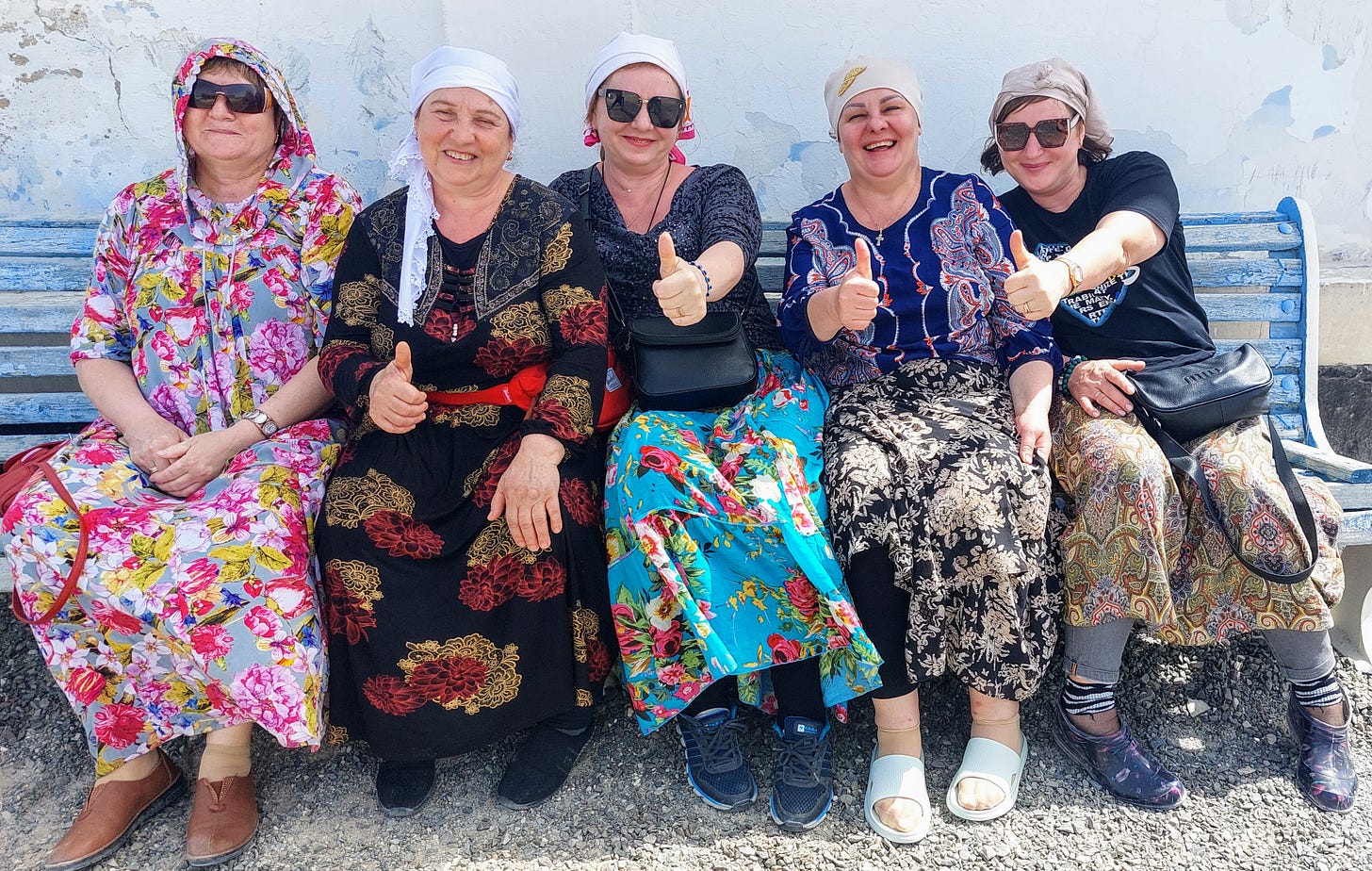
Lovely story!
I just love hearing about your adventures,and pass them on to others,who like me,can’t be
adventurous now..Don’t ever stop travelling or being interested by life anywhere..
Thankyou.
Sheila Garland..